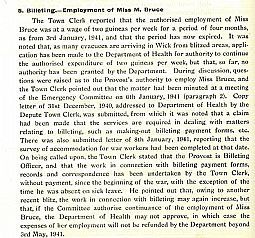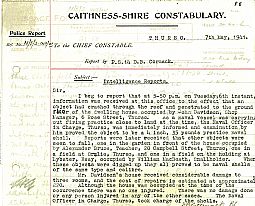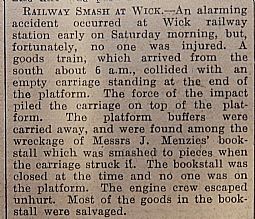Week 88: 5-11 May 1941
This week in Iraq, the RAF inflicted heavy losses on the pro-Axis government forces. The British navy captured German submarine U-110 on 9 May and with it an undamaged “Enigma” cipher machine as well as its code books; this would help the British break the Enigma code. Also this week, senior Nazi Rudolf Hess flew to Scotland on his own initiative to negotiate peace with Britain (where he was immediately arrested). And in one of the last acts of the Blitz German planes heavily bombed British cities, including London and Clydeside; from now on, German resources would be targeted against the planned invasion of the Soviet Union.
As a result of the bombing of British cities, “many evacuees are arriving in Wick from blitzed areas”. The Burgh had employed a temporary clerkess, Miss M Bruce, to handle the paperwork associated with billeting; but now the Burgh minutes noted that her wages wouldn’t be refunded by the Department of Health past the beginning of the month, even if “owing to another recent blitz, the work in connection with billeting may again increase”.
blitzed areas”. The Burgh had employed a temporary clerkess, Miss M Bruce, to handle the paperwork associated with billeting; but now the Burgh minutes noted that her wages wouldn’t be refunded by the Department of Health past the beginning of the month, even if “owing to another recent blitz, the work in connection with billeting may again increase”.
![]() Schools in Caithness were now back after the Easter break, and work began on planting the gardens. Stemster School recorded in the log book on 8 May, “Good progress made in the School Garden; 1 plot of potatoes planted; several rows of vegetables including leeks, parsley, parsnips, carrots, turnips, beetroot and lettuce.”
Schools in Caithness were now back after the Easter break, and work began on planting the gardens. Stemster School recorded in the log book on 8 May, “Good progress made in the School Garden; 1 plot of potatoes planted; several rows of vegetables including leeks, parsley, parsnips, carrots, turnips, beetroot and lettuce.”
The next day, Dunnet School noted: “Some gardening has been undertaken by the![]() pupils; potatoes were planted to-day – the children having provided the seed.”
pupils; potatoes were planted to-day – the children having provided the seed.”
 Daily life in Caithness continued to be hazardous, and not only from enemy action. The police recorded on 7 May that Thurso had been shelled with practice shells from a British ship: “I beg to report that at 5-50pm on Tuesday 6th instant … that an object had crashed through the roof and penetrated to the ground floor of the dwelling house occupied by John Davidson, Shop Manager, 6 Rose Street, Thurso.” Other shells landed on 20 Campbell Street, Thurso, in a field at Ormlie, Thurso, and at Lybster in Reay. No one was hurt, and investigations revealed that the shells came from a naval vessel which had been “carrying out firing practice close to land at the time.”
Daily life in Caithness continued to be hazardous, and not only from enemy action. The police recorded on 7 May that Thurso had been shelled with practice shells from a British ship: “I beg to report that at 5-50pm on Tuesday 6th instant … that an object had crashed through the roof and penetrated to the ground floor of the dwelling house occupied by John Davidson, Shop Manager, 6 Rose Street, Thurso.” Other shells landed on 20 Campbell Street, Thurso, in a field at Ormlie, Thurso, and at Lybster in Reay. No one was hurt, and investigations revealed that the shells came from a naval vessel which had been “carrying out firing practice close to land at the time.”
Finally this week, the John O’Groat Journal reported an alarming “railway smash at Wick” early on Saturday morning. An incoming goods train ploughed into an empty carriage standing at the end of the platform: the carriage was driven up on the platform, the buffers were carried away, and the J Menzies bookstall was “smashed to pieces when the carriage struck it”. Luckily there was no one on the platform at the time and the bookstall was closed, and no one was hurt.
Wick” early on Saturday morning. An incoming goods train ploughed into an empty carriage standing at the end of the platform: the carriage was driven up on the platform, the buffers were carried away, and the J Menzies bookstall was “smashed to pieces when the carriage struck it”. Luckily there was no one on the platform at the time and the bookstall was closed, and no one was hurt.
Coming soon! Week 89, 12th - 18th May 1941, will be published on Monday 12th May 2014. To view previous issues please use the menus on the right hand side of the page.
Come and join us on Facebook, let us know what you think about Caithness At War, ask any questions you may have or just say hello! Click on the Facebook link below to be taken directly to our page.
www.facebook.com/caithnessarchives
Comments
I remember the arrival of Hess - he was much talked about at the time and we were all puzzled as to what he wanted. We of course had no idea about the Enigma code as it was top secret at the time. It was a God,s Blessing too as it saved so many lives at sea and on land and help shorten the war.
e the gardening - i remember it well as we got no lessons after lunch one day a week if the weather was fine and we all trooped to the garden - each class to a bed were we competed with each other. The potatoes we went over the school wall into the plot of the houses next door and dug it up. We got the seed from our father's farm and the dung from John Allan's farm at nearby Gillock mains.
I can not remember much about the success of our efforts however excpt for the peas which were delicious.
We could hear the boom of the guns clearly as they were fired off Orkney as well as the rat a tat tat of the Bren and machine guns when the soldiers at the Watten Camp daily practised.



